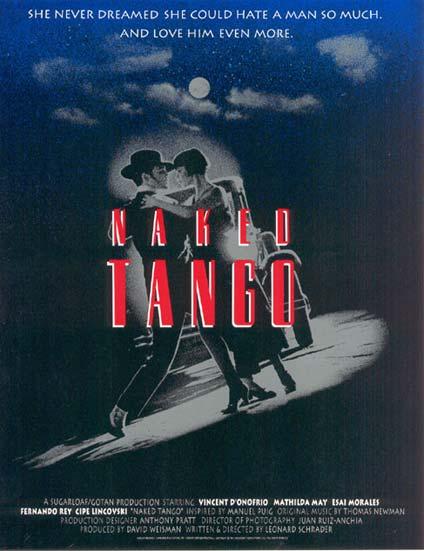 Here’s a 1990 film you probably didn’t see. It was an ambitious co-production from the producer—David Weisman (1942-2019)—and screenwriter—Leonard Schrader (1943-2006)—of the international hit KISS OF THE SPIDER WOMAN (1985). Weisman and Schrader (in his feature directorial debut) were justified in believing that NAKED TANGO, which like their previous film was inspired by the writings of the Argentine novelist Manuel Puig (1932-1990), might result in further success.
Here’s a 1990 film you probably didn’t see. It was an ambitious co-production from the producer—David Weisman (1942-2019)—and screenwriter—Leonard Schrader (1943-2006)—of the international hit KISS OF THE SPIDER WOMAN (1985). Weisman and Schrader (in his feature directorial debut) were justified in believing that NAKED TANGO, which like their previous film was inspired by the writings of the Argentine novelist Manuel Puig (1932-1990), might result in further success.
As it happened, NAKED TANGO was given lavish coverage in PLAYBOY and PREMIERE magazines, and acquired for US distribution by New Line Cinema. Yet the film ended up with a VERY limited 1991 release, and was then quickly forgotten (with its sole home video release being on VHS in Canada and Europe, and laser disc in Japan). What went wrong? Let’s see…
Set in the 1920s, it features Stephanie (Mathilda May), a sexy Argentine woman who on a Buenos Aires bound schooner witnesses a young woman committing suicide. Stephanie decides to switch identities with the woman, who turns out to have been a Polish mail order bride named Alba. Her husband is Zico Borenstein (Esai Morales), a suave pimp who forces Stephanie/Alba into prostitution. She, however, doesn’t take too well to this new reality and stabs her first “john” to death.
Enter the suave gangster and tango enthusiast Cholo (Vincent D’Onofrio), “the man every woman is afraid to want” (so claimed the trailer), who covers up the killing. He also forces Stephanie to get a Louise Brooks haircut and ply her wares in a swanky nightclub, interspaced with frequent bouts of expressive tango dancing. More killings are in store, as Cholo is incapable of staying out of trouble, and Stephanie finds herself increasingly aroused by his actions. She eventually deduces that Cholo has “stolen my soul. I don’t know if I’m Stephanie or Alba.” Further trouble arrives when Stephanie’s initial husband Judge Torres (Fernando Rey) turns back up, and complicates her existence further.
Leonard Schrader (brother of Paul), whose previous directorial experience was on the mondo-esque documentary THE KILLING OF AMERICA (1981), proved in NAKED TANGO that he wasn’t quite ready for non-documentary filmmaking. Certainly, the film looks good, with pretty cinematography by Juan Ruiz-Anchia (who made sure to utilize as many different color filters as possible) and production design by Anthony Pratt that offers a sumptuous recreation of early twentieth century Argentina, but the drama exists at an emotional remove. Even the copious dance scenes, choreographed by tango specialist Carlos Rivarola (who did the same job on 1987’s TANGO BAR and 1998’s TANGO), aren’t very invigorating.
Another problem is with the performances, particularly that of Mathilda May in the lead role. It would take a very strong actress to get viewers to go along with this complicated and enigmatic character, but May (who remains best known for playing the naked space babe in LIFEFORCE) isn’t up to the challenge. One of the screen’s great beauties, May is an amazing sight both clothed and otherwise, but fails to convey the complexity Schrader appears to have intended (it certainly doesn’t help matters that she affects a wholly unconvincing Spanish accent). Offsetting her is Vincent D’Onofrio, who despite playing a master seducer is never very seductive, pointing out another Leonard Schrader shortcoming: he wasn’t good with actors.
If the film works at all it’s as a sleazy erotic thriller, a far cry from the upscale art film that was intended. LAST TANGO IN PARIS (1972) essentially said all there is to say about the dramatic possibilities of tango dancing, and NAKED TANGO has very little to add.
Vital Statistics
NAKED TANGO
Surgarloaf/Gotan Productions, Inc.
Director: Leonard Schrader
Producer: David Weisman
Screenplay: Leonard Schrader
Cinematography: Juan Ruiz-Anchia
Editing: Debra McDermott
Cast: Mathilda May, Vincent D’Onofrio, Esai Morales, Fernando Rey, Cipe Lincovsky, Josh Mostel, Constance McCashin, Patriciio Bisso, Javier Portales, Ruben Szuchmacher, Marcus Woinski, Sergio Lerer
